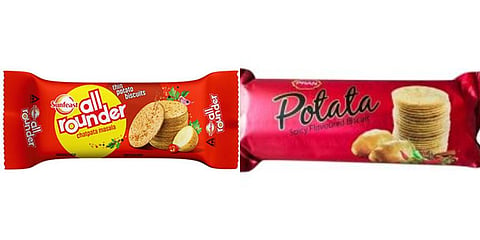

NEW DELHI: Packaged food major ITC Ltd has launched “Sunfeast All-Rounder” – a ‘chatpata masala’ flavored ‘thin potato biscuits’ widely advertising it is as “India’s own” just weeks after Bangladesh-based Pran Foods’ Potata became an internet sensation.
However, questions have been raised on its identical product packaging, which comes in bright red colour with a stacking of potato wafers in the same quadrant on the wrapper, triggering concerns over violation of trade dress under the ambit of Intellectual Property Rights (IPR).
“It is a fairly common branding strategy to deliberately use some similar elements. But that said, ITC seems to have the upper hand here because of the distinct brand name. At this stage, Pran can make a ‘trade dress’ claim. But, protection of trade dress is an evolving concept and doesn’t have much of a legal recognition in India,” said Nikhil Narendran, a Partner in Trilegal.
Trade dress is a form of intellectual property, which deals with the visual or sensual appearance of a packaged product, which can even include its packaging, shape, combination of colors which may be registered and protected from being used by competitors in relation to their business and services. In India, there is no specific definition of trade dress under Trademark Act 1999. But due to the development in intellectual property laws, a new amendment recognised trade dress protection through a new definition of a trademark under Section 2 of the Trademark Act.
The common law of passing off provides protection of trade dress. According to Ankur Raheja, an expert in IPR law, “this case can amount to passing-off as to packaging. The packaging gets a cover under Copyright Act as to artistic work, and that need not be compulsorily registered in India. However, it may not be easy as the court may look into various other factors in addition to packaging such as for how long and how widely the product of the Bangladesh brand is available in India, and if the reputation of the other brand (Pran) is being impacted. Passing off is akin to trade mark infringement, but applies to protect unregistered rights associated with a particular business, its goods or services.
Law professionals agree that similarity exists in this case, but they say it is a theoretical argument as all ‘copying’ is not actionable under law. Also, high-profile trademark disputes, such as the litigation between Britannia and ITC over the packaging of digestive biscuits or even the Emami-HUL tussle over rights of brand name, often pit big businesses against one another. But, when the defendant is a relatively smaller company it can be a life-or-death contest.
FMCG major ITC Ltd has a stronger distribution muscle and with the new launch the company is well placed to disrupt India’s Rs 6,000 crore cracker biscuits category. Pran is not as big as ITC Ltd, but it isn’t a small company either. It has a factory in Agartala, Tripura and the brand Potata has a registered trademark in India. The company exports to over 140 countries and its export revenues alone are nearly Rs.100 crore.
Dev Robinson, partner and national practice head, IPR, Shardul Amarchand Mangaldas & Co pointed out that, “only that which comes too close such that there is confusion in the minds of the consumers, or very close in terms of artwork etc., may be actionable. Even in saying so, two products of different sources and having similar overall visual get up may not be actionable, one against the other, if either one cannot demonstrate having acquired significant goodwill. This presupposes the fact that none of them have trade mark registrations, because if one does, a trade mark gives a prima facie actionable right in the favour of the registrant”.
He further added that the court has to balance both the similarities and the dissimilarities in this case, to arrive at a position as to whether the dissimilarities are sufficient to enable a person of average intelligence to discern that the two products are indeed from different sources. In other words, such a person would not confuse one product as actually being the other.
“Even given the similarities that both packages are predominantly red, have stacking of potato wafers, presence of natural potato, spices and herbs, the common elements have been differently used. Therefore, the similarities, though they exist, are not likely to be sufficient to be able to objectively conclude that there is an infringement either in copyright, trademark or the law of passing off and trade dress.”
ITC Ltd has dodged the query and refused to comment. Ahsan Khan Chowdhury, chairman and CEO of the Pran-RFL Group, the parent company which owns the brand, said “it doesn’t have any copyright issues with ITC”. Nonetheless, even if the company is dragged to the courts, ITC will be well prepared to defend such claims, as this is part of the business environment, noted Sandeep Pai, partner at Link Legal.